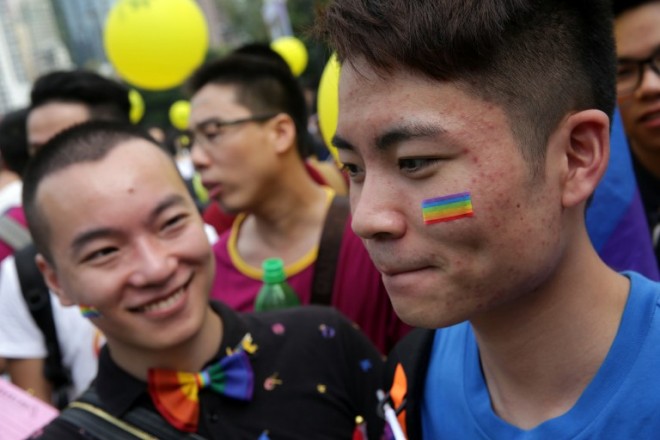
People take part in the lesbian, gay, bisexual and transgender parade in Hong Kong on Nov. 6. Hong Kong’s streets were colored by rainbow flags as protesters marched in the city’s annual gay pride parade to call for equality and same-sex marriage. AFP
HONG KONG, China—Hong Kong’s streets were a sea of rainbow flags on Saturday as protesters marched in the city’s annual gay pride parade to call for equality and same-sex marriage.
Around a thousand demonstrators paraded through downtown Hong Kong, with many complaining that the city lags behind other major Asian hubs in terms of LGBT rights.
“There’s still a lot of room to improve, compared to Taiwan and even to Japan,” Carol Yung, a 40-year-old marketing officer in the music industry, told AFP.
“These days they are … already discussing about same-sex marriage, but in Hong Kong we’re still very far behind,” Yung said.
Taiwan, which held a massive pride parade attended by nearly 80,000 people last month, is one of the most progressive Asian countries when it comes to homosexuality, but a bill to make same-sex marriage legal has been stalled in parliament since it was first proposed in 2013.
Hong Kong’s LGBT community has for years sought a ban on discrimination on the grounds of sexual orientation.
LGBT issues are in the spotlight again this month after comments from the city’s Catholic bishop, which angered many in the community.
Cardinal John Tong, in a letter published Thursday, said concepts of marriage and family were being “challenged” by what he called “the gay movement.”
If a Sexual Orientation Discrimination Ordinance were enacted, or gay marriage legalized “this would force our society into undergoing a change that would turn it upside-down,” Tong said.
In another development, the judgement for a landmark court case, in which a gay British woman challenged the government’s refusal to grant her a visa to live in the territory with her partner, is expected in November.
QT, as she is referred to in court, had called the authorities’ decision to be “discriminatory.” She entered into a civil partnership in Britain in 2011 and moved to Hong Kong in the same year after her partner was offered a job in the city.
One of Saturday’s marchers, Mark Green, 54, who works in the city’s fashion industry, told AFP however that things were progressing.
“I think Hong Kong is making enormous progress. We’re seeing changes … in the way that people react and respond to gay people in the work place and society,” Green said.
But “the government is really a little bit behind the times when it comes to recognizing LGBT rights,” he said, adding that even China recognizes the need to give same-sex couples dependent visas.